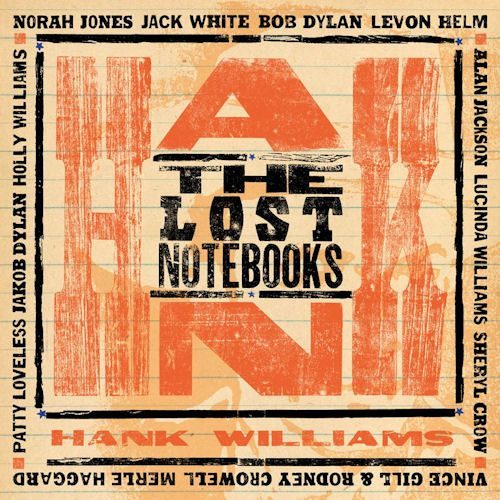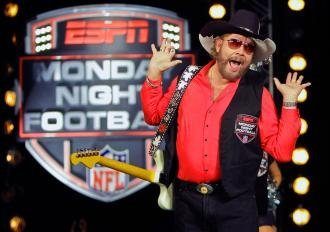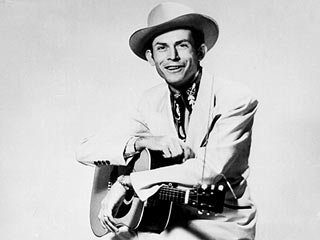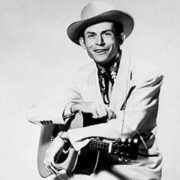LOST NOTEBOOKS OF HANK WILLIAMS
TITLE: THE LOST NOTEBOOKS OF HANK WILLIAMS
ARTIST: VARIOUS
LABEL: COLUMBIA MUSIC
RELEASE DATE: OCTOBER 4TH, 2011
Dancing on Ol’ Hank’s Grave:
Bocephus Steps on Papa’s Posthumous Album Release
 October 4, 2011; the much-anticipated release of The Lost Notebooks of Hank Williams, spearheaded by Bob Dylan for Hank William’s estate, had to take a back seat today to more urgent news about Hank Williams, Jr. Bocephus crashed the party by getting booted off of Monday Night Football, where his sun-glasses tough guy persona has reigned supreme since 1989, due to his unfortunate comparing of President Obama to Adolph Hitler in an ESPN interview over the weekend.
October 4, 2011; the much-anticipated release of The Lost Notebooks of Hank Williams, spearheaded by Bob Dylan for Hank William’s estate, had to take a back seat today to more urgent news about Hank Williams, Jr. Bocephus crashed the party by getting booted off of Monday Night Football, where his sun-glasses tough guy persona has reigned supreme since 1989, due to his unfortunate comparing of President Obama to Adolph Hitler in an ESPN interview over the weekend.
So instead of waking up to cheering news that major contemporary artists Alan Jackson, Merle Haggard, Sheryl Crow, Jack White, Levon Helm, Vince Gill and Rodney Crowell, Patty Loveless, Norah Jones, Lucinda Williams, and Bob Dylan had rescued a dozen of Hank Sr.’s lyrics that he had never had time to set to music, and created a masterpiece of a tribute album to the “Shakespeare of Country Music,” all of the attention on AOL’s Huffpost this morning went to his jackass son, who has never been shy about calling attention to himself. After all, as he put it in an old song, it’s a Family Tradition.
Opining about the recent effort of Obama and Republican Speaker of the House John Boehner to have a golfing summit to attempt a bi-partisan meeting of the minds before the hardheaded negotiations begin over Obama’s Jobs Bill, Hank Jr. likened it to “Adolph Hitler getting together with Netanyahu. What’s the point?” asked a political obscurantist best known for such diplomatic pronouncements as Whiskey Bent and Hell Bound.
ESPN corporate heads put their minds together and decided they did not want Obama as Hitler Hank’s “Are You Ready For Some Football?” to be the face of their next Monday night telecast. So for the first time in over twenty years they kicked off without him.
 “There’s no such thing as bad publicity,” said studio mogul Jack Warner, who ought to have known, but Hollywood’s greatest studio head never met Hank William’s Jr. He might have changed his mind. I’m sure Bob Dylan is just thrilled that this horse’s posterior is now forever linked to his warm-hearted and generous celebration of Hank Sr.’s shining legacy, due to the fact that Hank Sr.’s granddaughter Holly Williams is also on the album, backed up by her dad, Bocephus.
“There’s no such thing as bad publicity,” said studio mogul Jack Warner, who ought to have known, but Hollywood’s greatest studio head never met Hank William’s Jr. He might have changed his mind. I’m sure Bob Dylan is just thrilled that this horse’s posterior is now forever linked to his warm-hearted and generous celebration of Hank Sr.’s shining legacy, due to the fact that Hank Sr.’s granddaughter Holly Williams is also on the album, backed up by her dad, Bocephus.
Indeed, the first artist Bob Dylan approached after sitting on these lyrics for over a year before deciding what to do with them, was Holly. He approached her after a gig and simply handed a sheaf of them to her with a minimalist introduction: “They found some lyrics and thought they could be turned into complete songs.” No mention of Hank; no mention of who “they” were, or how he had come by them. She took one look at the simple phrases, so elegant and drenched with his familiar themes of lost love and loneliness, and realized immediately what Dylan had handed her—the missing link to her heritage. He asked her to pick a favorite out and set it to music and he would continue to reach out to other artists to complete the album. What had begun as a request for him to take on the whole project himself ended as a richly imagined collective effort to connect the Father of Country Music to his many spiritual (and physical) heirs. Dylan gave Hank Williams’ lost notebooks back to country music—and beyond, including modern jazz artists such as Norah Jones and rock guitarists like Jack White—expanding the original horizons of producers who were simply hoping for a Dylan/Williams collaboration.
 What it became is little short of magical—a Hank Williams both reconnected to his roots and embraced by musicians far removed from country.
What it became is little short of magical—a Hank Williams both reconnected to his roots and embraced by musicians far removed from country.
This American masterpiece begins with Alan Jackson’s virtual channeling of Hank’s spirit in the lyric You’ve Been Lonesome Too. His heartache underscored by a single violin added to Jackson’s guitar has all the earmarks of an original 1940s recording—probably captured with a period ribbon microphone. Dylan comes next, with a mariachi-propelled waltz The Love That Faded, and Dylan’s anguished vocal lifting it off the page. Norah Jones adds an ethereal jazz-inflected vocal to How Many Times Have You Broken My Heart. Then Jack White goes for the jugular in a pain-filled version of You Know That I Know. His blending of rock anger with country heartbreak makes it riveting.
I’m So Happy I Found You brings Lucinda Williams (no relation) to the edge of tears without ever losing the taut emotional balance of Hank’s singular blend of joy and sorrow. Vince Gill and Rodney Crowell take the reins for a refreshingly old-fashioned folk sounding I Hope You Shed a Million Tears you could easily imagine hearing at a local music gathering—if you happened on one with a sublime acoustic guitarist like Vince Gill. Track no.7, You’re Through Fooling Me shows off Patty Loveless’ pure country sound reminiscent of early classic voices like Kitty Wells and Patsy Cline. It will take you back in time. To my ear, the lonesomest sound on the record is that of Dylan’s former Band member Levon Helm, who essays You’ll Never Again Be Mine—not because he succeeds in channeling Hank Williams, but because he reaches past Hank to channel country music’s most soulful voice, “the possum,” George Jones. More country than that it doesn’t get, not in this lifetime.
But arguably the heart and soul of these lost notebooks is in the 9th track, Blue Is My Heart, the lyric Holly Williams chose to set to music. She succeeds magnificently, and helping her bring life to Hank’s words is her old man—that’s right, Bocephus, the name Hank, Sr. bestowed on his son Randall Hank Williams’s Jr. when he was still in the cradle. Holly, with Hank Jr. backing her in a heartfelt understated (you heard me right) harmony, brings her grandpa to life in the simplest of terms—no exaggerated emotion on either part, but letting Hank Sr.’s incomparable lyrics tell the story unadorned. It’s a great tribute, and displays a side of Hank Jr. utterly belied by his swaggering public persona. When he wants to be, he is a great artist in his own right. This is truly a family tradition.
If you want to hear what a kinder, gentler and younger Bob Dylan may have sounded like, listen to the next track, where his son Jakob Dylan, leader of The Wallflowers, lends his voice to the plaintive cry of Oh Mama, Come Home. He adds his own welcome sense of familial continuity to another lost lyric that had it not been for his pater familias might have continued to gather dust for another half century. Luckily, Bob knew what to do with them and gave us this great album—a second chance for Hank to speak as only he could, in a voice that has now become blended with all the voices he helped inspire to take up a guitar in the first place.
Sheryl Crow then gives a more contemporary sound to a lovely ballad called Angel Mine. And finally, on track #12, they give Jesus the last word: Merle Haggard delivers Hank’s version of The Sermon On the Mount, which is every bit as powerful as I Saw the Light. When Hag sings, “He came to heal the blind and lame” you believe it—a beautiful ending to a beautiful album. Listening through it made me so happy I could cry.
Ross Altman has a Ph.D. in English. Before becoming a full-time folk singer he taught college English and Speech. He now sings around California for libraries, unions, schools, political groups and folk festivals. You can reach Ross at Greygoosemusic@aol.com













